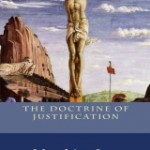“This passage [Gen. 9:6], therefore, solves the problem that engaged the attention of Plato and all the sages. They come to the conclusion that it is impossible to carry on government without injustice… For if [the emperor] is like other men, it is the height of wrong and injustice for him not to want to be like others but to place himself at the head of others through despotism. —Martin Luther (AE 2:142)

This past weekend, the Boston Marathon bomber Dzhokhar Tsarnaev was dealt the death penalty by a Federal court jury.
This jury made up of Bostonians all decided that in this case the death penalty was necessary (see a nice summary by Al Mohler here). By doing this, did these persons violate the law of God? And if any of the jury were Christians, were they required, according to the commands of Scripture, to show mercy?
Some evidently think so. In a recent post on his Jesus Creed blog here at patheos, Scot McKnight writes:
The reason Christians should oppose the death penalty is because they believe that (1) humans are Eikons of God who, because of the redemptive work of the trinitarian God in the Cross, Resurrection, and Pentecost, (2) can be restored to union with God and communion with others.
I agree with his points but do not agree this means Christians should oppose the death penalty.
Those like myself who argue for the death penalty insist that it actually does show compassion: for the victims of violent and heinous crimes.* It sends the message that, because of the harm it does to others, certain kinds of behavior are simply intolerable and cannot be allowed to stand.
That said, is it possible that an overuse of the death penalty**, for example, might lead hearts that should otherwise retain compassion into an overly callous state? I certainly would not deny this. And yet, I note with interest that in the West in recent years, the argument has been shifting from when or how the death penalty should be applied to whether it should be applied at all.
And it has in many cases been prominent and respected Christian leaders leading this charge. Arguing that such violence is inherently against the character of God, leaders like Pope Francis have said that “Nowadays the death penalty is inadmissible, no matter how serious the crime committed.” (see here)
But what do the Scriptures say? In Genesis 9 we read:
“And for your lifeblood I will require a reckoning: from every beast I will require it and from man. From his fellow man I will require a reckoning for the life of man. Whoever sheds the blood of man, by man shall his blood be shed, for God made man in his own image.”
In the N.T. this is re-iterated in the book of Romans, chapter 13:
“For rulers are not a terror to good conduct, but to bad. Would you have no fear of the one who is in authority? Then do what is good, and you will receive his approval, for he is God’s servant for your good. But if you do wrong, be afraid, for he does not bear the sword in vain. For he is the servant of God, an avenger who carries out God’s wrath on the wrongdoer. Therefore one must be in subjection, not only to avoid God’s wrath but also for the sake of conscience.” (see also John 19:11 and I Peter 2:13-14)
What does this mean? (I suggest that we American Christians in particular have a real hard time dealing with Romans 13)

First, “God himself is at work when man punishes his fellow man for murder by taking his life in retribution. God ‘seeks a reckoning’ from man by the agency of man. God is the one who kills and makes alive (1 Sam. 2:6; 2 Kings 5:7).” The government is ordained by God to do what individual Christians are commanded not to do: wield the sword.***
Second, although God does not desire the death of the wicked, in this temporal realm, the death penalty is a qualified good – while “not the way it is supposed to be” it is “good” in that it counters the effects of the fallen world, also “not the way it is supposed to be”.
Third, it, like natural marriage, points to something greater beyond itself: it is an icon indicating the realities that transcend this earthly life. Natural marriage is a sign of the peace and joy that comes with the church – all believers – being united to Christ. The death penalty serves as an icon not of earthly punishment by death, what the book of Revelation calls the first death, but rather what it calls the “second death” – which is the final judgment and punishment of those who reject Christ and His word. In sum, there is a “final cutoff” and judgement for wickedness.
Of course, talking about hell is becoming less acceptable these days. But we dare not forget that there is indeed a final judgment, executed by God Himself. The thief on the cross experienced a final earthly judgment (“the due reward for our deeds” [Luke 23:41]) – and was in the process saved from the eternal judgment. Undoubtedly, this pleased God! After all, we can never say that God is pleased with the death of the wicked in an unqualified sense – for He does not desire their death – but He especially does not desire the eternal death of the wicked!
The death penalty helps us to take the threat of eternal death seriously.
And that goes for all of us – the wicked (see Romans 4:5 and surrounding verses). For all of us are implicated in the high treason of our first parents, Adam and Eve. As John Bombaro notes, treason means “cooperating in the usurping… the sovereign’s rule”, or “consciously and purposely acting to aid and abet” his enemies. (p. 129, Making the Case for Christianity, ed. Maas) Further, “humanity has a specific problem, not just sins – the treacherous things we think, say, and do – but a treacherous disposition, a nature given to rebellion. No one is exempt. In this humanity is unified. It is this nature and the fruit of our nature that leaves us condemned for treason before the great King.” (p. 130, see more here)
And we all know the penalty for high treason.
And here it will do us no good to insist that it really isn’t our fault – but that we were influenced by others and came under their sway. That argument did not work for the Nazi War criminals and it most definitely did not work for Dzhokhar Tsarnaev.
I have some real sympathies for Christians who feel they must oppose the death penalty. With that said however, are not persons like Pope Francis wrongly binding the consciences of good Christian people in insisting that “Nowadays the death penalty is inadmissible, no matter how serious the crime committed”? Not only this, but I think the matter here is even more serious. Does support of the death penalty by some Christians not need to be retained? Not in order that man may have His desire for “revenge” quenched – and not even because there is no other way to protect innocent victims in this or that case – but simply in order to point out that the God who is love could not be such without His wrath?
If this message is lost, the entire need for Christ’s death is thrown into question. Why did Christ have to die? The idea that Christ in any sense died because of our sins or for our sins is lost when the utter seriousness of our crimes is lost.****
Further, is not cursing the enemies of the faithful is built into the very fabric of the promise – salvation from sin, death and the devil? Can there be salvation without corresponding damnation? Can there be gospel without law? Can there be deliverance and mercy without justice? Simply put: can darkness exist with light or must evil and its offspring ultimately be dealt with forever?
![Blessed is everyone who takes refuge in Him! [Psalm 2:12]](https://infanttheology.files.wordpress.com/2015/05/christ.jpg)
Pastor Holger Sonntag says it well:
“When Christ died, he served others by giving his life as a ransom for many (Matt. 20:28). He paid their debt toward God in full; he redeemed them with his holy blood as the spotless Lamb of God (John 1:29; 1 Peter 1:18-19). He absorbed God’s curse over sinful mankind when he hung on the cross, so that man might inherit God’s blessing (Gal. 3:10, 13, see Deut. 27:26; 21:23). He became sin, so that man might become righteousness (2 Cor. 5:21). He reconciled the world to God: for Christ’s sake, God does not count man’s sins against him (2 Cor. 5:19). God’s reconciliation in Christ is the unilateral end of God’s war against sinful mankind. It is the end of God’s wrath in Christ stirred up by our sin. Christ is now man’s peace with God (Eph. 2:14); Christ is man’s salvation and righteousness (1 Cor. 1:30).” (The Death Penalty: a Lutheran Position)
And this goes even for the enemies of Him and His people if they will come. As there is still time and the “final cutoff” tarries. As He desires the salvation – and not the death – of every human being…
Again, we have all committed high treason. And we all know what the price for such treachery is. God is perfectly just. And yes, God is perfectly loving. None of us are both. We, being human, can not say “Vengence is mine, I will repay” (Deut. 32:35; Rom. 12:19; Heb. 10:30), and do so perfectly. Only the Lord can, for only His anger – and not the anger of man (nevertheless to be enacted in capital punishment through “official anger” or “just anger”) – is in perfect alignment with what is good, true, and right. Only His anger is perfectly driven by perfect love – that love that aims to restore all to union with Himself and communion with all others.
… if for only a brief moment in this life then for an eternity in the next.
Finally, I close with this from Martin Luther, “describing the restrained and decidedly not self-righteous deliberations of a Christian judge prior to his resolute action”:
When dealing with a wicked person, his thoughts are to be: “Oh, my God, how gladly I would die for this man, if it could be done! *****
FIN
All images from Wikipedia commons.
Notes:
* W. B. Reynolds, “The Death Penalty Is not Cruel and Unusual Punishment,” in The Bill of Rights: Original Meaning and Current Understanding, ed. E. W. Hickok, Jr. (Charlottesville, London: Univ. Press of Virginia, 1991), 327-330, esp. 327f.: “[Anger] is a normal, healthy feeling, and one that, among others, makes us human and sets us apart from mere animals. Indeed, if we should ever stop feeling anger (strong, deep, disturbing anger) at senseless, premeditated crimes of violence against individuals or society, we ourselves have then surrendered a measure of our own humanity. For our anger displays a certain, essential level of caring for our fellow human beings. It shows that we are not indifferent to the fate of those who share – or who once did share – life with us.” …Reynolds wishes the anger to be administered, not by individuals, but in an orderly process of justice. (quoted in his Pastor Holger Sonntag’s unpublished paper, The Death Penalty: a Lutheran Position)
** “… at that time, putting to Death was a recipe much in vogue with all trades and professions, and not least of all with Tellson’s [Bank]. Death is Nature’s remedy for all things, and why not Legislation’s? Accordingly, the forger was put to Death; the utterer of a bad note was put to Death; the unlawful opener of a letter was put to Death; the purloiner of forty shillings and sixpence was put to Death; the holder of a horse at Tellson’s door, who made off with it, was put to Death; the coiner of a bad shilling was put to Death; the sounders of three-fourths of the notes in the whole gamut of Crime, were put to Death. Not that it did the least good in the way of prevention – it might almost have been worth remarking that the fact was exactly reverse – but, it cleared off (as to this world) the trouble of each particular case, and left nothing else connected with it to be looked after.” —–A Tale of Two Cities (Running Press: Philadelphia, PA, 1986), 46. (quoted in Sonntag)
*** Pastor Holger Sonntag,: “God here gives man a share in his own authority over man’s life and thereby over man’s bodily existence as a whole: for if you can take a man’s life then you can take everything that pertains to this life. And this is the establishment of the government of men over men by God, not by minimalist mutual contracts among men emerging out of distrust, war, and enmity, as envisioned by Beccaria and other social contract theorists.”
**** Pastor Holger Sonntag writes: “How would a justice system look like in which retributive (distributive) justice were not the basis of the entire legal system? How could the justice of a given punishment be ascertained? Why does one crime merit a 2-month sentence on probation, why does another merit community service, while another is punished by a life sentence?” and “Reflecting on the purposes of punishment in general, we can say, then, that the chief factor in the death penalty is retribution. This is not to say that, for murder and other offenses, the bible does not know other purposes as well. E.g., it knows of the deterrent power of punishment (general prevention), according to Deut. 13:11 etc. It also knows of the defensive function of punishment, according to Ps. 82:4. It also knows of the “pedagogical” function of punishment by parents, according to Prov. 13:24. It knows of the power of punishment to bring a person (or group of persons) to change their ways (special prevention, “repentance”), according to Lev. 26:14-45. In the case of Israel, the death penalty has the further purpose of rooting evil out of God’s holy people, according to Deut. 21:21 (In the NT age this purpose of punishment is retained as excommunication [by the word, not by the sword], see 1 Cor. 5:13 where Paul quotes from the OT law). All this is true and good; yet the fact remains: as far as God is concerned, the chief factor at least in capital punishment is retribution that lets the capital deed fall back on the doer. What has by and large become a historically outdated and morally questionable byword in the discussion on (capital) punishment turns out to be the primary purpose of punishment according to God’s unchanging word and order.” (Again, quoted in unpublished manuscript, The Death Penalty: a Lutheran Position, Holger Sonntag)
***** Ibid.












